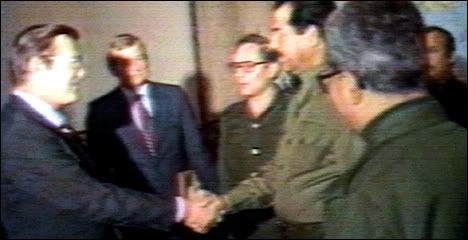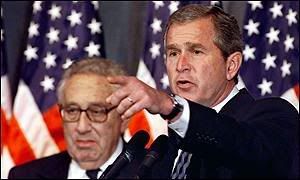| Latest | Greatest | Lobby | Journals | Search | Options | Help | Login |
|
|
|
This topic is archived. |
| Home » Discuss » Archives » General Discussion (1/22-2007 thru 12/14/2010) |
|
| Octafish
|
Sun Feb-11-07 08:48 PM Original message |
| Anyone can go to Baghdad. Real men go to Tehran. |
|
Those were the words of a "senior Bush administration official" in 2003. Wish I knew who that was, because I'd like to give him (or her) a piece of my mind.
 So, after 3,122 American deaths and perhaps 650,000 Iraqi deaths, we are finally seeing the majority of We the People are on these gangsters in the Bush White House. And if we can see them, you know they can see us. And that means they know the jig is up. So that's why they're doing all they can to pull off an even bigger caper in Iran. They think that will make everybody forget that they lied America into war in Iraq. Well, it won't work. Still, they'll go for the prize -- the Prize as in "Blood of the Earth." Real Men Go To Tehran The Roman historian Tacitus observed: "Crime once exposed has no refuge but in audacity." "Tony Blair says he doesn't want other nations interfering in Iraq. That sounds familiar. It is exactly what America and the UK were accused of after invading that country." (Leader, 'Drifting to war in Iran,' Daily Mirror, October 7, 2005) By Dave Edwards October 26, 2005 EXCERPT... America and the UK were, and are, accused of rather more than that, as Noam Chomsky points out in his new book Imperial Ambitions:
SNIP... The Mirror noted that Blair insisted five times in his press conference that he was just telling journalists "exactly what I know". This +should+ have brought back painful memories of claims made about Iraqi WMD. In a February 2003 interview with the BBC, Blair said:
As we now know, it was Blair, not the intelligence services, who was "making the whole thing up". Blair was speaking the day after an anonymous British official accused Iran of supplying Iraqi insurgents with sophisticated roadside bombs that have killed eight British soldiers and two security guards since May. The official claimed the bombs were designed and manufactured by the Tehran-backed guerrilla group Hezbollah, based in Lebanon, and smuggled to Iraq via Iran. He blamed the smuggling of the bombs on the Iranian Revolutionary Guard Corps, answerable to Iran's highest executive body, the national security council. He also suggested that the Iranian government's motives were "to tie down the 'coalition' in Iraq". (Ewen MacAskill, Simon Tisdall and Richard Norton-Taylor, 'UK accuses Iran over killings of soldiers,' The Guardian, October 6, 2005) SNIP... Journalist Robert Fisk of the Independent, who has regularly reported from inside Iraq over the past three years, describes claims of "Iranians coming over the border" as "a total myth." (http://www.thetruthseeker.co.uk/article.asp?ID=3689, October 12, 2005) CONTINUED... http://www.zmag.org/sustainers/content/2005-10/26edwards.cfm  Robert Parry of Consortiumnews.com explains the rationale behind Bush and Blair's "audacity"... The Logic of a Wider Mideast War By Robert Parry January 14, 2007 White House press secretary Tony Snow dismisses expectations of war with Iran as an urban legend and Joint Chiefs of Staff chairman Peter Pace says that from a military standpoint theres no need to cross the Iranian border. But there are still strong reasons to suspect the Iraq War may soon spill over to Iran and possibly Syria. SNIP... Backfired Threat SNIP... Bush may now feel he needs to punish Iran over its nuclear program to disabuse Tehran and other rogue states from taking to heart the Saddam lesson, that they are better off rejecting American demands than acquiescing to them. Besides the logic of a wider war, there is also evidence that military planning is underway to attack Iran. At a not-for-quotation briefing before his national televised speech on Jan. 10, Bush and his top national security aides stunned senior TV news executives with suggestions that a major confrontation with Iran is looming. Commenting about the briefing on MSNBC after Bushs nationwide address, NBCs Washington bureau chief Tim Russert said theres a strong sense in the upper echelons of the White House that Iran is going to surface relatively quickly as a major issue in the country and the world in a very acute way. Russert and NBC anchor Brian Williams depicted this White House emphasis on Iran as the biggest surprise from the briefing as Bush stepped into the meeting to speak passionately about why he is determined to prevail in the Middle East. The Presidents inference was this: that an entire region would blow up from the inside, the core being Iraq, from the inside out, Williams said, paraphrasing Bush. Russert said Bush defended his invasion of Iraq by arguing that he had headed off a hypothetical Iraqi-Iranian nuclear arms race. Thats the way he sees the world, said Russert, looking slightly perplexed. His rationale, he believes, for going into Iraq still was one that was sound. CONTINUED... http://consortiumnews.com/2007/011407.html  Then, there's all that oil. And whoever controls the oil, controls the world. Blood of the Earth: Dilip Hiro on the Battle for the Worlds Vanishing Oil Resources Amy Goodman Democracynow.org Wednesday, January 31st, 2007 In his new book, veteran Middle East Journalist Dilip Hiro offers a detailed account of how and why the planets limited supply of oil has come to revolutionize human behavior, politics and warfare across the globe. He joins us for a wide-ranging interview. (includes rush transcript) SNIP... AMY GOODMAN: Were joined now by the books author, Dilip Hiro, veteran journalist in the Middle East. His trilogy of books on Iraq and Iran are considered some of the most definitive histories of the wars in the Persian Gulf. Welcome to Democracy Now! How did oil become so central, Dilip Hiro? DILIP HIRO: I think oil became important when the internal combustion engine was fueled by petroleum. See, in 1905 that happened. Before that, you could fuel internal combustion engine with electricity or with steam. You know, but then oil proved to be the most important. And then, 1905, Henry Ford, his mass production of cars, that really made the whole thing go up. And in terms of warfare, it was during World War I that in the tank, internal combustion engine was fueled by petroleum products. And that made the whole technology, certainly of war, change in the way like the first finding of gun powder in 1041. Because, see, as a general you could now -- see, before that, they had to depend on horses, cavalry, and the horses had to be fed, they had to rest and so on. But once you had a tank, you could go 30, 40 miles in a day. And that changed the whole way the war was fought. So oil is very important. SNIP... DILIP HIRO: Absolutely, Amy. You know, of course, there is a great book by Daniel Yergin called The Prize. You know, and when he goes on, its in 1859 in Titusville, Pennsylvania, oil was first drilled properly. Im sorry, he is wrong. It first happened near Baku in 1846, and it was a Russian engineer, he did that. And everything we know about oil happened there first. It was first in the Caspian they changed from coal to oil. It was the first time in that part of the world they set up oil pipeline made of wood. For the first time, they had a tanker, oil tanker. So all of that actually originally comes from Azerbaijan and Baku. And, of course, you mentioned Nobel brothers. And, of course, you know, Rothschilds, they made their money there, as well. So I think the oil has been so important. But what I have done in my book, I point out there was local Azeris who became very rich. One of them was totally illiterate, but he had a most wonderful library, and he built something like 135 buildings. So, I think the oil has been this very powerful mineral. AMY GOODMAN: Can you talk about the history of countries nationalizing oil? DILIP HIRO: Absolutely. You see, initially, of course, America was very much ahead in terms of extraction. You know, they were competing with Azerbaijan. But by the turn of the century, America took off because its much bigger, and more energy was put into it. And at that time, countries in the Persian Gulf area, you know, like Saudi Arabia, Kuwait, etc., etc., they did not have the technology, and so they were courting foreign companies, especially British companies, to come and find oil. And in the whole region, it was the British company, Anglo-Persian Oil Company, which got a contract. Except where? In Saudi Arabia. In 1933, the Saudi king gave a concession to the Standard Oil Company of California. And from that day onwards, as we speak now, the nexus between Saudi Arabia and Washington, D.C. is so tight, that despite the fact that 15 out of 19 hijackers were Saudi citizens, nothing changed. Two days after 9/11, George W. Bush was smoking cigars around with the Saudi ambassador, Prince Bandar. Well, you know, hes called not Prince Bandar, hes called Bandar Bush. So, you see, that oil is absolutely and definitely important in shaping diplomacy. Now, in terms of oil nationalization, it only came after 1973 Arab-Israeli war, because then oil price went up and those countries had more money, and so they bought up the foreign companies, you know, Western companies. AMY GOODMAN: Let's continue on the theme of Saudi Arabia and Washington, which you document well and you take us to Texas, as well. And particularly talk about the intermingling of the Saudi royal family and the Bush family in the United States. DILIP HIRO: Absolutely, Amy. See, some of the things that I found, you know, they are actually something which can give you sleepless nights. Honestly. In the USA -- Im talking over land, Im not talking offshore -- in the USA, there are half a million oil wells, and their output is about 5 million. On an average, the US oil well produces ten barrels a day. And I have been to Qatar. I have been to Kuwait. In that part of the world, oil well produces 2,500 barrels a day. 250 times more. Now, if you go to Qatar or Kuwait and say, Have you seen a donkey pump? they say, What? I mean, we you don't have donkeys here. This pump that goes up and down, which you can see all over Texas and California, they don't exist in the Persian Gulf area. Why? Because the pressure, natural pressure is so high that you don't have to pump it out. You know, and that explains so much. Another figure: in 1935, the USA produced 64% of world oil. Last year, they produced 8%. That means oil has been used up. And remember, Richard Nixon in 1973, he was the first one, oil independence: we will be free of oil imports by 1979. And Gerry Ford came in. He said, No, well be free in 1985. Jimmy Carter came in. He said 1990. And then we have George W. Bush, last year, he woke up and he said American addiction to oil is undesirable. And then, you know what happened in last State of the Union speech? He said, We are going to give 22% more federal money for research into alternative fuels. And the next day, the New York Times reported that the National Renewable Laboratory is sacking people -- AMY GOODMAN: Renewable Energy Laboratory. DILIP HIRO: -- including researchers on wind and ethanol. They were being sacked. So, you see, everything that comes from the White house you should really take it with huge pinch of salt. CONTINUED w audio http://www.democracynow.org/article.pl?sid=07/01/31/1543222 Gee. And to think Gen. Franks called Doug Feith the stupidest effing guy on the planet. He must've forgot one:  Then, again, Franks did say "guy" and not "monkey." |
| Printer Friendly | Permalink | | Top |
| Home » Discuss » Archives » General Discussion (1/22-2007 thru 12/14/2010) |
|
Powered by DCForum+ Version 1.1 Copyright 1997-2002 DCScripts.com
Software has been extensively modified by the DU administrators
Important Notices: By participating on this discussion board, visitors agree to abide by the rules outlined on our Rules page. Messages posted on the Democratic Underground Discussion Forums are the opinions of the individuals who post them, and do not necessarily represent the opinions of Democratic Underground, LLC.
Home | Discussion Forums | Journals | Store | Donate
About DU | Contact Us | Privacy Policy
Got a message for Democratic Underground? Click here to send us a message.
© 2001 - 2011 Democratic Underground, LLC